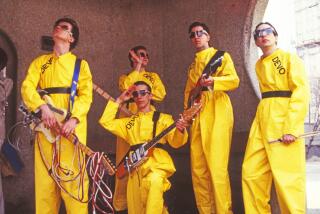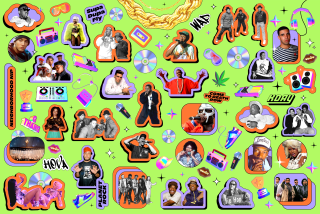Bands That Work : It Was ‘80s Indie-Label Groups That Most Influenced Big Acts of the ‘90s
- Share via
Bands like Wang Chung and Men at Work sold millions in the 1980s--but were they the bands that mattered?
While these groups were all over then-new MTV, they weren’t the ones that most influenced the bands that have taken their place in the pop mainstream of the ‘90s.
That role belongs to musicians who were part of a remarkable grass-roots scene that defined the independent, often rebellious spirit of rock ‘n’ roll. They scoffed at the very idea of hit singles, music videos and other trappings associated with major-label acts.
Extending the do-it-yourself, punk-rooted ethos of the late-’70s, indie labels such as Southern California’s SST, Minneapolis-based Twin Tone and the tiny, New York-based Homestead released some of the most unsettling, passionate and influential rock of the decade.
Few caused so much as a commercial ripple.
But without such essential noisemakers as Black Flag, Husker Du, the Minutemen and the Melvins, among others, there simply would be no Nirvana, no Pearl Jam, no Offspring . . . and no grunge. And try imagining Soul Asylum or the Goo Goo Dolls without the trailblazing if unpredictable Replacements.
A closer look at the ‘80s makes it clear that what was once the alternative has become the mainstream.
“ ‘Alternative rock’ is just a term used to make something like punk palatable for radio,” suggests Greg Ginn, the ex-Black Flag guitarist who owns three indie labels, including SST, New Alliance and Cruz. “But the true indie bands have an audience that runs much deeper than just one song on MTV or the radio.
“They build a fan base through constant touring, so their following knows what the bands are doing . . . what they’re really about. . . . I think the groups I’ve worked with are more substantial and thereby have been more influential on subsequent groups and sounds.”
Sonic Youth, Husker Du, Soundgarden and the Meat Puppets are the most notable of Ginn’s 15 acts that eventually made the jump to major labels. The most respected musicians from the ‘80s, stressed Ginn, have continued to try to move their music forward.
“The Minutemen evolved into Firehose, and [Minutemen/Firehose bassist-singer Mike Watt] had a great solo album [“Contemplating the Engine Room”] last year,” said Ginn, who now fronts the Greg Ginn Band. “Bob Mould has made some really interesting solo albums since Husker Du broke up. . . . H.R. [lead singer-guitarist of Bad Brains] has moved away from hard-core [punk] and moved more into reggae with his solo stuff. And look how much [the Replacements’] Paul Westerberg has reinvented himself as a solo act.
“I mean, after you’re in one of those fashionable, MTV-created bands, what kind of artistic endeavor are you capable of? I don’t think there are a lot of Husker Du fans that are crazy about the return of Boy George.”
*
Patrick “Pooch” DiPuccio agrees, suggesting that artists who have aligned themselves with something modern or experimental were the ones who found the key to maintaining artistic relevance.
“The best players have been too busy creating to just rehash the past,” said Pooch, a founding editor of the Pasadena-based indie-rock fanzine Flipside. “Even though the Clash was offered gobs of money to reunite, [singer-bassist] Mick Jones went on to form Big Audio Dynamite, which was an important step for him to take.
“Now there’s Elvis [Costello] and Burt Bacharach [collaborating],” he said. “How cool is that?”
More to Read
The biggest entertainment stories
Get our big stories about Hollywood, film, television, music, arts, culture and more right in your inbox as soon as they publish.
You may occasionally receive promotional content from the Los Angeles Times.










